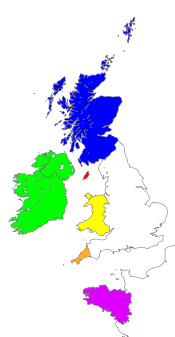Introduction

Celtic languages today
The term "Insular" refers to the place of origin of these languages, namely the British Isles, in contrast to the (now extinct) Continental Celtic languages of mainland Europe and Anatolia. There is a theory that the Brythonic and Goidelic languages evolved together in those islands, having a common ancestor more recent than any shared with the Continental Celtic languages such as Celtiberian, Gaulish, Galatian and Lepontic, among others, all of which are long extinct.
The Insular Celtic group consists of the modern Celtic languages, which are generally further subdivided into
The verb
The table below shows a reconstruction of indicative present verb endings.
C.f. also Old Irish verb inflection.
| Number | Present | |
| Absolute | Conjunct | |
| Sg.1 | -āiōs | -āiō |
| Sg.1 | -ā[mi]s | -ā[mi] |
| Sg.2 | -āieis | -āiei |
| Sg.3 | -ā[ti]s | -āie |
| rel. | -ā[s]so | |
| Pl.1 | -āiomos[i]s | -āiomos |
| rel. | -āiomoses | |
| Pl.2 | -āieteses | -āietes |
| Pl.3 | -āiontes | -āiont[o] |
| rel. | -āionteso | |
Language Family Tree
Indo-European > Classical Indo-European > Celtic > Nuclear Celtic > TGB Celtic > Insular Celtic- Brythonic
- Old-Modern Welsh
- [owl] Old-Middle Welsh
- [cym] Welsh
- Southwestern Brythonic
- Old-Modern Welsh
- Goidelic
- Modern Goidelic
- Eastern Goidelic
- [glv] Manx
- [gla] Scottish Gaelic
- [gle] Irish
- Eastern Goidelic
- [sga] Early Irish
- Modern Goidelic